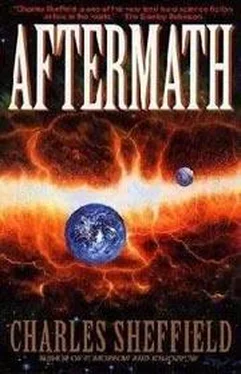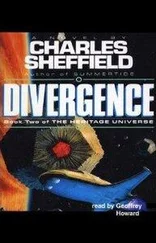“Sure it is. I’m not deaf, I heard how you spoke to her. You’re soft on her. Just remember to keep your pants up.”
“It’s nothing to do with sex. But I’m going back to Washington.”
“I know that. Ed and I were talking about it this morning, before you got here.”
“How could you? I only just made up my mind I had to go.”
“All the same, we knew it. We’ve seen it before.” And now Joe did smile, the slow, self-satisfied grin of a man who has seen his predictions come to pass. “You arrive up here, see, and you tell us the world has gone to hell. First it was the Lascelles virus, that airborne thing that would kill the lot of us.”
“It would have, if they hadn’t come up with the viral phage and released it.”
“Maybe. Point is, they did and nothing happened. I bet your neighbors in Olney gave you hell when you got back, sending them running for the hills the way you did. Then there was Scarlatti, going to vaporize Washington.”
“He tried.”
“Sure he tried. Lots of people try things. Point is, he failed. And now there’s this Supernova Alpha thing, and from what I hear that’s fading away, too.”
“This is different.”
“So what me and Ed figure,” Joe went on, as though Art had not spoken, “we figure this. Every couple of years the craziness down there in Washington gets too much for you, and you head up here for a jolt of sanity. You ought to stay, and when you get a few more years on you, you probably will. But you’re young, you still got this feather up your ass to save the world — not that most of it’s worth saving. So you’re going back, one more time. But tell me this. The cars don’t run, and the buses don’t run, and the trains don’t run. So how do you think you’ll go? Your knee’s near as bad as mine.”
The question of the hour. He couldn’t ride a bike such a distance, even if he had one. If he walked, Joe was right, his knee made it close to impossible and the journey would take weeks.
“Damned if I know. Got any ideas?”
“Nothing special.” Joe sat down, rubbed at his scar, and stared into space. “But here’s a thought, for what it’s worth. Did you know that Annie keeps three horses on her place?”
March 23, 2026.
There is a tide in the affairs of men, which, taken at the flood, leads on to fortune.”
Saul Steinmetz raised weary eyes from the daily briefing package and stared at the cloth text hanging on his wall. His mother had embroidered it for him when he was nine years old.
There ought to be more, an addition that read: “ But sometimes it lands you at a raw sewage outlet.”
Like now.
During the past eight hours he had met with twenty-three senior officials of the executive branch, with six Senators, and with the heads of the nation’s three biggest conglomerates. He had made decisions on how to finance the federal debt; how to pay the military when electronic transfers had ceased to exist and the public was suspicious of paper money; how much to draw down the government grain and dairy stockpiles; and where and how to send food supplies. He had discussed protocol for U.S. embassies overseas and foreign embassies here, approved Army manpower allocation to preserve and in some cases reestablish the inland waterways, and ordered a red-alert status at the Mexican border.
Saul had done all this, yet felt that he had done too little and usually too late. Decisions based on incomplete information were one thing, a fact of political life. Decisions made with no information were another. How could you manage the world’s largest and most complex economy, when everything was interlocked and you had no idea of the status of key components? It was blindfold chess, played with imperfect knowledge of the initial position.
For the thousandth time in the past weeks, he turned toward the holographic projection unit in the corner of the office. For the thousandth time, the volume sat empty. How long before information services got the Persona back in operation? Or would they never do it, given the general collapse of data services?
A movement outside the window caught his eye. He stared, stabbed at the interoffice controller, then realized that he had tried it twice already today. In spite of optimistic promises it too was still not repaired. He raised his voice. “Auden!”
Auden Travis appeared so quickly that Saul wondered if the aide spent his days and nights lying outside the door of the Oval Office, although his elegant clothing denied that.
“Yes, Mr. President? Sir, it is working now, actually.”
“Outside?”
“Just a few lines. But we can patch you to anywhere in the country.”
“Good. That’s not what I need at the moment, though. Is General Mackay in the building?”
He hardly needed Travis’s nod. With external systems down, the only way to get access to the President was by staying close. Auden wasn’t the only one willing to spend his nights and days on the threshold. Did they realize, any of them, how little real power he had now?
“Shall I get her, Mr. President?” Travis was studying and perplexed by the changing expressions on Steinmetz’s face.
“If you please.”
When Auden was gone Saul turned his attention again to the briefing documents — handwritten, most of them, though one or two had been hammered out on an ancient typewriter. Somebody must have been rifling the Smithsonian collections for anything that worked.
Last night he had asked for a summary of the situation around the world. What he had received was patchy, even with the best available sources, but he could see enough to extrapolate a pattern. The places where technology was the newest and most advanced had been hit the worst. Total system breakdown there had caused the loss of food, water, and power. Deaths in the hundreds of millions to billions were reported for the Golden Ring countries, the Sino Consortium, and the Federation of Indian States.
Reported, how? Probably through the ham radio net. Some of the amateurs had held on to their old equipment, and been back on the air within days.
South America and the southern part of Africa had a different problem. They did not have so complex a technological infrastructure to lose, but the vast weather changes produced by Supernova Alpha more than made up for that. They were tottering on the brink of government collapse.
Countries with new technology built on top of an older one had managed the best. Europe and North America still had the skeletons of despised and ignored old communications, power, and transportation systems, sitting underneath the slick and glossy fabric of today’s — or yesterday’s — advances. It was depressing, to sit in the middle of chaos and be told that you were one of the lucky ones.
The report said nothing about Australia, where a recent craze for everything new must have combined with the most severe storm systems; but the absence of news from Australia told its own story.
Of course, the weather patterns in both hemispheres were not based on observation. They were based on computer predictions, and the computer models relied on historical weather data. God knows how good or bad they might be today. Saul turned in irritation to the unit where the global weather was normally updated every half hour from metsat data. The display was dark — and even dusty. Nobody had mentioned it to him, but the cleaning services must be in as much chaos as everything else.
He turned as a perfunctory knock on the door preceded General Grace Mackay, hurrying along ahead of Auden Travis. The Secretary of Defense — intense, dark-haired, and skeleton-thin — had a cadaver’s smile on her tired face.
“I think we have some good news, Mr. President.”
Читать дальше












